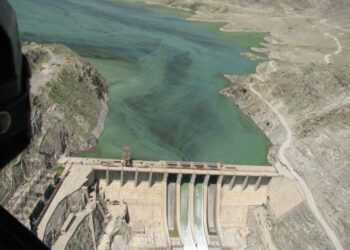Written By Abdullah Gilani
World Maritime Day, celebrated annually on the last Thursday of September, is a global event that underscores the importance of the maritime industry and its contributions to international trade and global prosperity. As the maritime sector continues to evolve, it faces new challenges and opportunities. The theme for world Maritime Day 2024, “Navigating the Future: Safety First”, highlights the critical importance of prioritizing safety in a rapidly changing world. The maritime industry is a cornerstone of the global economy, responsible for transporting over 80% of international trade by volume. Ensuring safety in maritime operations is not merely about compliance with regulations but about safeguarding lives, protecting the environment and securing global trade routes. This vast and complex sector involves diverse activities, from cargo shipping and passenger transport to offshore oil and gas exploration. Given its scale and complexity, safety in maritime operations is paramount. Ensuring the safety of ships, crews and cargoes is not just a regulatory obligation but a moral imperative to prevent loss of life and environment damage.
Historically, the evolution of maritime safety has been marked by significant milestones. Maritime safety has been driven by a series of international conventions and regulations. The International Maritime Organization (IMO), a specialized agency of the United Nations, plays a central role in establishing and enforcing safety standards. The SOLAS (Safety of Life at Sea) Convention, established in 1914 in response to the Titanic disaster, has been pivotal in enhancing ship safety through stringent requirements on construction, equipment and crew training. International Convention for the Prevention of Pollution from Ships (MARPOL) addresses environmental protection, while the Standards of Training, Certification and watch-keeping for seafarers (STCW) ensure that maritime personnel are properly trained and qualified. These conventions are key frameworks that have significantly improved maritime safety over the decades these regulations have evolved over time, incorporating advancements in technology and addressing new safety concerns. For instance, the introduction of the International Ship and Port facility Security (ISPS) Code in 2004 marked a significant shift towards enhanced security measures in response to the threats posed by terrorism and also need to address emerging risks and incorporate new technologies, reflecting the dynamic nature of the maritime environment.
Updating and strengthening regulatory frameworks is essential to address emerging risks and ensure the safety of maritime operations. The IMO and other regulatory bodies should continue to review and revise safety standards to keep pace with technological advancements and changing environmental conditions. Additionally, ensuring effective enforcement and compliance with regulations is crucial for maintaining high safety standards. Effective enforcement and compliance mechanisms are essential for maintaining high safety standards. The development of regulations for autonomous ships, cyber security and climate change adaption are examples of areas where updated frameworks are needed. Ensuring that regulations are flexible and adaptable to technological and environmental changes is important for maintaining their relevance and effectiveness.
Investing in research and development (R&D) is critical for advancing maritime safety. Research into new technologies, safety practices and risk mitigation strategies can lead to innovative solutions and improvements in safety outcomes. Government, industry stakeholders and research institutions should prioritize R&D efforts and support initiatives that address key safety challenges. Collaborative research efforts, such as those focused on developing advanced safety systems, improving emergency response capabilities and exploring sustainable practices can drive progress in maritime safety. Funding for R&D projects and support for innovation are essential for fostering advancements that enhance safety and resilience
Training and education are fundamental to ensuring a skilled and knowledgeable workforce. Maritime professionals must be equipped with the necessary skills and knowledge to navigate complex and evolving safety environments. Training programs should cover a wide range of topics, including new technologies, safety management practices and emergency response procedures. Ongoing professional development and certification are also important for maintaining high safety standards. Industry organizations, educational institutions and training providers should collaborate to develop and deliver relevant training programs that address current and emerging safety issues.
Fostering a culture of safety within organizations and the broader maritime community is essential for achieving safety goals. A strong safety culture encourages individuals to prioritize safety, report hazards and actively participate in safety initiatives. Leadership commitment, clear communication and employee engagement are key components of a positive safety culture. Organizations should promote safety awareness through regular safety meetings, feedback mechanisms and recognition of safety achievements. Creating an environment where safety is prioritized and valued contributes to reducing accidents and improving overall safety performance.
Sustainability and safety are interconnected, as environmental protection and safety go hand in hand. Adopting sustainable practices, such as reducing greenhouse gas emissions and minimizing pollution, contributes to a safer and healthier maritime environment. The industry should continue to explore and implement sustainable solutions that align with safety objectives. Furthermore, embracing sustainability involves implementing measures that not only reduce environmental impact but also enhance overall maritime safety. Innovations like cleaner fuels, energy-efficient technologies and waste management systems can prevent pollution and minimize ecological damage.
Navigating the Future: Safety First” is a timely and important theme for World Maritime Day 2024. As the maritime industry faces new challenges and opportunities, prioritizing safety remains essential for protecting lives, preserving the environment and ensuring the continued success of global trade. By addressing emerging risks, embracing technological innovations and fostering international collaboration, the maritime sector can navigate the future with confidence and resilience. Through proactive strategies and a commitment to safety, the industry can build a secure and sustainable maritime future for generations to come.

























